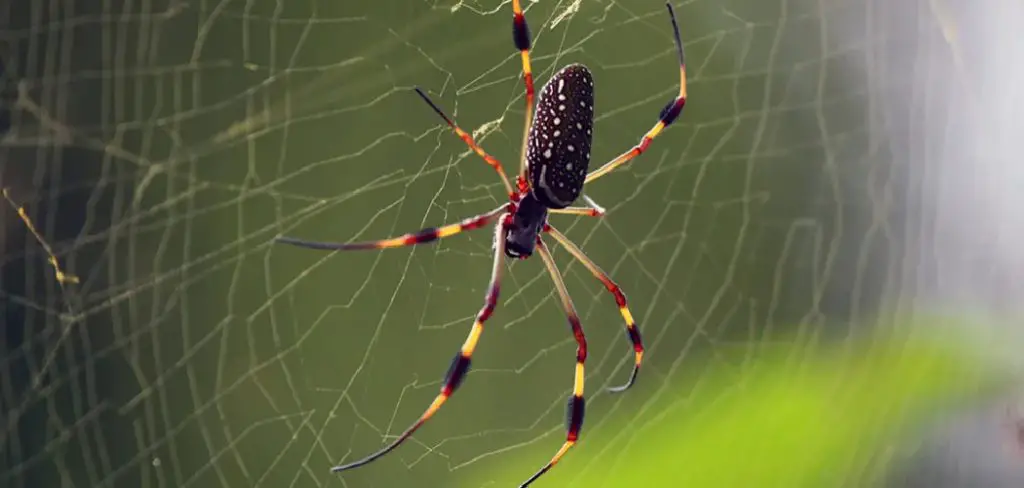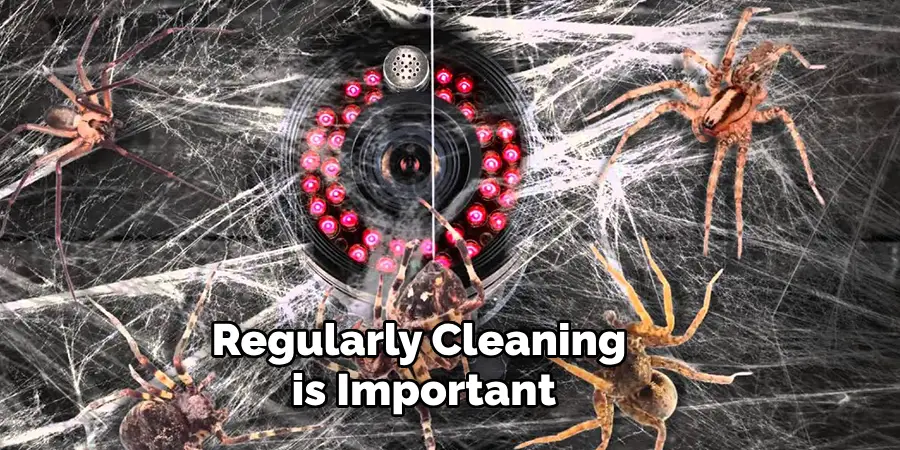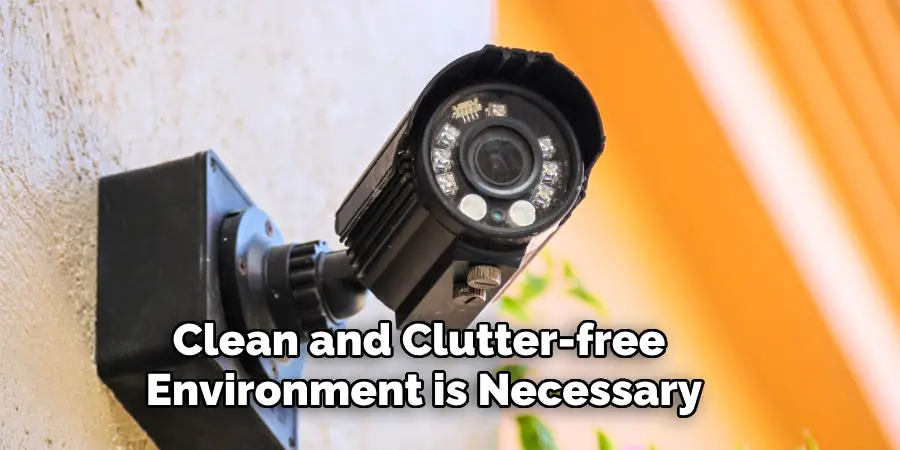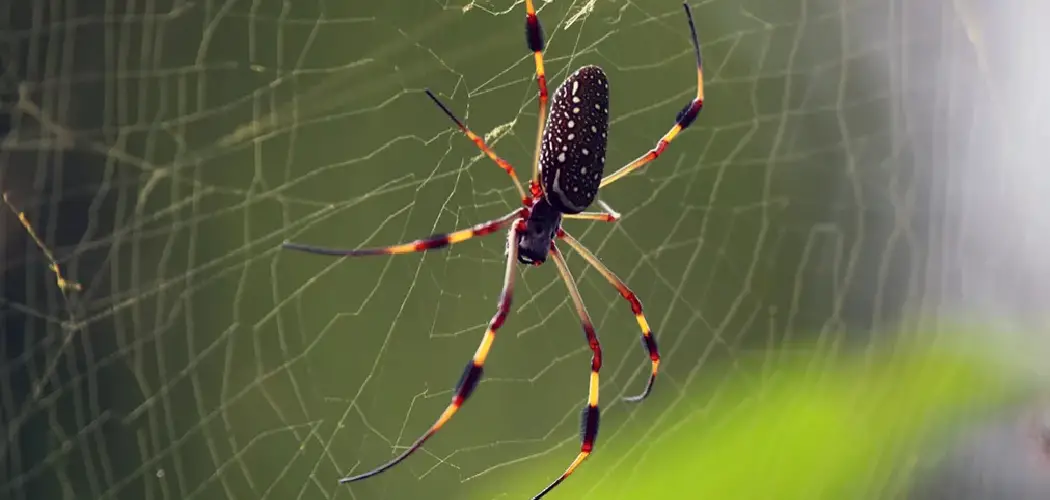Spiders can be a real nuisance when it comes to maintaining the clarity and functionality of security cameras. They are attracted to the infrared lights emitted by the cameras. They might spin webs or crawl across the lenses, significantly reducing the quality of the footage and, potentially, the effectiveness of your security system.

This guide on how to keep spiders off security cameras aims to provide you with simple, practical solutions to deter spiders from making your security cameras their new home.
From natural deterrents to more technical preventative measures, we’ll cover a variety of strategies that you can employ to keep those pesky arachnids at bay. Whether you’re a homeowner, a business owner, or just someone looking to protect your property, these tips will help ensure that your security cameras remain clear and spider-free.
What are the Benefits of Keeping Spiders Off Security Cameras?
Aside from the obvious aesthetic issue of having spider webs covering your cameras’ lenses, there are several benefits to keeping spiders off your security cameras.
- Clearer Footage: Spider webs and debris can obstruct the view of your security cameras, making it difficult to see any potential threats or incidents. By keeping spiders away, you can ensure that your footage remains clear and usable.
- Longer Lifespan for Cameras: The accumulation of spider webs and droppings on security cameras can damage their lenses and other components over time. By preventing spiders from building their homes on your cameras, you can extend their lifespan and save yourself from having to replace them frequently.
- More Effective Security: When security cameras are covered in spider webs, their effectiveness is compromised, as any movement or activity captured by the cameras may be mistaken for a threat. By keeping spiders off your cameras, you can ensure that your security system is operating at its best.
Now that we’ve established the importance of keeping spiders away from security cameras, let’s dive into some practical methods for doing so.
What Will You Need?
Before we get into the methods, here’s a list of items that you may need to carry out these strategies:
- Natural Deterrents: Essential oils such as peppermint, eucalyptus, and tea tree are known to repel spiders. You can also place citrus peels or vinegar near your cameras.
- Cleaning Supplies: A microfiber cloth, compressed air, and a soft-bristled brush can help you remove any existing spider webs and debris from your cameras.
- Commercial Products: Various spider repellent sprays and deterrent devices are available on the market specifically designed to keep spiders away from cameras.
- Electrical Tape or Duct Tape: These can be used to create physical barriers around the cameras to prevent spiders from crawling on them.

Once you have these items ready, you can start implementing the following methods to keep spiders off your security cameras.
10 Easy Steps on How to Keep Spiders Off Security Cameras
Step 1. Regular Cleaning
One of the most straightforward and effective ways to keep spiders off your security cameras is by regularly cleaning the cameras and their surrounding areas. Spiders are attracted to security cameras because they offer a source of warmth and attract insects, which are a food source for spiders. By regularly wiping down the camera lenses with a microfiber cloth, you can remove any dust, debris, and early webs that might attract spiders.
Additionally, use compressed air to blow away any particles from crevices and a soft-bristled brush for stubborn webs. Ensure the areas around the cameras are free from clutter and any vegetation trimmed back, as these can provide hiding spots and anchor points for webs. Maintaining a clean and tidy environment not only deters spiders but also ensures your cameras’ lenses remain clear for optimal viewing and recording quality.
Step 2. Use Natural Deterrents
Applying natural deterrents around your security cameras can effectively keep spiders away without harming them or the environment. Essential oils, particularly peppermint, eucalyptus, and tea tree oil, have been shown to repel spiders due to their strong scent.
Create a diluted solution by mixing a few drops of your chosen essential oil with water in a spray bottle. Spray this mixture around the cameras, making sure not to get any on the lens. Additionally, placing citrus peels or cotton balls soaked in vinegar near your cameras can serve as a natural repellent. These methods are safe and environmentally friendly and can be reapplied as needed to maintain their effectiveness.
Step 3. Install Physical Barriers
Another method to deter spiders from your security cameras is to install physical barriers. This can be achieved by using electrical tape or duct tape to seal off any openings or gaps around the camera where spiders might enter or establish a web. Be cautious to keep tape away from the camera’s lens and any ventilation holes that are necessary for preventing overheating.
If applicable, consider using small mesh screens or enclosures as a barrier, ensuring they do not impair the camera’s function or reduce the quality of the footage. Physical barriers are an effective way to prevent spiders from accessing your cameras, reducing the likelihood of webs and ensuring your security system remains unobstructed and fully operational.
Step 4. Utilize Commercial Spider Repellents
Commercial spider repellents can be highly effective for those seeking a more robust solution against spiders. These products come in various forms, such as sprays and ultrasonic devices, designed to deter spiders from approaching your security cameras. When selecting a spider repellent, opt for options that are environmentally friendly and safe for outdoor use.
Apply the repellent according to the manufacturer’s instructions, focusing on areas around the camera but avoiding direct application on the camera lens or internal parts. It’s essential to reapply these repellents periodically to maintain their effectiveness. Using commercial spider repellents provides an additional layer of protection, keeping your security cameras free from webs and ensuring uninterrupted surveillance.
Step 5. Lighting Adjustments
Spiders are often attracted to security cameras because they attract insects, which in turn serve as a food source for spiders. One effective strategy to reduce this attraction is to adjust the lighting around your cameras. Insects are drawn to bright lights, so consider using motion-activated lights instead of continuous lighting.

This not only helps to conserve energy but also reduces the number of insects around your cameras, making them less appealing to spiders. Furthermore, positioning lights in a way that they illuminate the area without directly hitting the camera can further decrease insect activity around your security devices. By making these adjustments to the lighting, you can significantly reduce the likelihood of spiders being drawn to your security cameras.
Step 6. Check and Seal Entrances
Frequently inspecting your property and sealing any cracks, gaps, or holes is a critical step in preventing spiders from entering and nesting around your security cameras. Spiders can squeeze through very small spaces to find a suitable spot for their webs. Use caulk to seal any openings found around windows, doors, and the exterior of your home, where wires and cables enter.
Pay special attention to areas immediately surrounding your security cameras, as these are prime targets for spiders seeking warmth or hunting for insects attracted by the camera’s lights. Sealing these entrances not only helps to keep spiders away but also enhances the overall security of your home by eliminating potential entry points for pests.
Step 7. Employ Strategic Landscaping
Landscaping can play a significant role in deterring spiders from your security cameras. By strategically planting certain types of plants around your property, you can create a natural barrier against spiders. Plants like lavender, mint, and eucalyptus are known for their spider-repellent properties due to their strong scents.
Planting these around your property’s perimeter or near your security cameras’ locations can discourage spiders from approaching. Additionally, keeping your lawn trimmed and removing any debris or clutter will reduce hiding spots for spiders and other insects, making your property less attractive to them. Strategic landscaping not only enhances the curb appeal of your property but also serves as an effective means of keeping spiders at bay.
Step 8. Routine Maintenance and Cleaning
Regularly cleaning and performing maintenance checks on your security cameras is essential for preventing spider webs and ensuring the devices function correctly. Dust, pollen, and other environmental debris can accumulate on the surfaces of your cameras, making them more attractive to spiders seeking to establish webs. Use a soft, clean cloth to gently wipe down the camera housing and any protective covers.

If possible, use compressed air to blow away debris from harder-to-reach areas without touching the lens. Additionally, inspecting your cameras for any signs of damage or wear can help identify potential entry points for spiders. Routine maintenance should be conducted at least once every few months or more frequently in areas prone to spider activity. This step not only aids in keeping spiders at bay but also prolongs the life of your security equipment, ensuring you get the most out of your investment.
Step 9. Leverage Natural Predators
Incorporating natural predators into your strategy can be an eco-friendly way to control the spider population around your security cameras. Birds and certain types of insects, such as ladybugs and praying mantises, are known to prey on spiders. Installing bird feeders or houses to attract birds can help reduce the number of spiders in the area.
Likewise, encouraging a habitat for ladybugs and praying mantises by planting gardens with flowers that attract these beneficial insects can further diminish spider populations. Employing natural predators offers a dual benefit: it contributes to the ecological balance in your garden while helping keep your security cameras free from spider webs and ensuring optimal operation.
Step 10. Implement Physical Barriers

Creating physical barriers effectively prevents spiders from accessing your security cameras. One approach is to use silicone-based sealants or foam around any openings where camera wires enter the house, ensuring these gaps are completely sealed. Another method involves installing fine mesh or netting around areas where spiders are likely to build webs, such as the corners and edges of outdoor security cameras.
These barriers should be checked and cleaned regularly to maintain their effectiveness. Additionally, consider using anti-spider coatings on the surfaces of your security cameras. These coatings can deter spiders from settling and building webs on the cameras. Implementing physical barriers adds an extra level of defense against spiders, ensuring your security cameras remain clear and fully functional.
By following these steps, you can significantly reduce the likelihood of spiders building webs on and around your security cameras. Implementing a combination of strategies that best fit your unique situation will help keep your home secure while minimizing spider activity.
5 Additional Tips and Tricks:
- Essential Oils: Spiders detest the smell of certain essential oils, such as peppermint, tea tree, and lavender. Applying a few drops of these oils around the cameras can act as a natural deterrent.
- LED Lights: Switching to LED lights can help keep spiders away. Spiders are attracted to warm and cozy spaces, and traditional bulbs emit more heat compared to LED lights.
- Mothballs: Placing mothballs around the camera can also help in keeping spiders at bay. The strong smell of naphthalene in mothballs is a natural repellent for spiders.
- Regular Cleaning: Regularly cleaning and dusting around the cameras can not only keep spiders away but also help in maintaining clear footage. Spiders tend to build webs and leave droppings, which can affect the camera’s view.
- Professional Pest Control: If the spider infestation is severe, it is best to call a professional pest control service. They can help identify the source of the problem and provide effective solutions to keep spiders away from security cameras.

It is also important to note that prevention is better than cure when it comes to keeping spiders off security cameras.
5 Things You Should Avoid
- Ignoring Environmental Factors: Avoid overlooking the importance of the camera’s surroundings. Tall grass, nearby shrubbery, and clutter around the camera can provide hiding spots for spiders and other insects, making the camera more attractive to them.
- Overuse of Harsh Chemicals: Relying too heavily on strong chemicals or insecticides near your security cameras can damage them or shorten their lifespan. It’s also not eco-friendly or safe for pets and humans in the vicinity.
- Blocking Camera Vents: Avoid sealing or blocking any ventilation openings on the camera housing. While it might seem like a good idea to keep spiders out, it can cause overheating and malfunctioning cameras.
- Neglecting Regular Inspections: Failure to check and clean the cameras regularly can lead to a build-up of webs and nests. This not only obstructs the camera’s view but can also lead to permanent damage if not addressed promptly.
- Homemade Remedies Without Research: While it’s tempting to use homemade concoctions or old wives’ tales to deter spiders, some methods can be ineffective or even harmful to the camera’s functioning. Always research and ensure that any home remedy will not corrode or damage the camera housing or lens.
By avoiding these common mistakes, you can more effectively keep spiders away from your security cameras, ensuring clear and uninterrupted surveillance.
What Smell Do Spiders Hate?
Spiders are known to have a strong sense of smell, and there are certain scents that they dislike. Apart from the essential oils mentioned above, spiders also hate the smell of citrus fruits like:
- Lemon: The smell of lemon can repel spiders and prevent them from making webs around the camera.
- Orange: Orange peels or essential oils can also act as a natural spider deterrent.
- Cedarwood: Cedarwood chips or essential oils have been known to keep spiders away due to their strong scent.

Additionally, some other smells that spiders dislike include vinegar, eucalyptus, and garlic. By incorporating these scents into your cleaning routine or using them around the security cameras, you can help keep spiders away naturally. However, it is important to note that strong smells can also be harmful to humans and pets in large quantities, so use caution when applying these scents near your home and security cameras.
What Colour Do Spiders Hate?
There is no evidence to suggest that spiders have a particular aversion to specific colors. However, some homeowners believe that painting the area around their security cameras blue or yellow can help deter spiders. This belief may stem from the fact that many insects are attracted to bright floral colors like yellow and pink but tend to avoid blue hues.
While there is no scientific proof of this theory, keeping the area around your security cameras clean and free of clutter can also help in keeping spiders away. Additionally, painting the walls or fences near the cameras with oil-based paint can act as a natural barrier against spiders and other insects.

Conclusion
In conclusion, how to keep spiders off security cameras involves a combination of proactive measures and natural deterrents. From essential oils and LED lights to regular cleaning and professional pest control, these strategies can effectively keep spiders at bay. It’s also crucial to avoid common pitfalls like neglecting environmental factors or relying too heavily on harsh chemicals, which can do more harm than good.
Incorporating smells that spiders hate, such as citrus fruits and cedarwood, into your maintenance routine can offer an additional layer of protection without resorting to harmful substances. While there’s no definitive evidence linking spider aversion to specific colors, maintaining a clean and clutter-free environment around your security cameras is universally recognized as a best practice.
By understanding and implementing these tips and tricks, you can ensure that your security cameras remain clear, functional, and free of unwanted arachnid guests.

